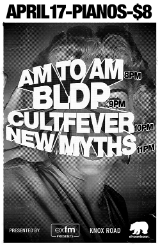
Every [two weeks?] Jamie Hale takes a long, hard look at the music industry and the blog scene that feeds it. Here, he releases those findings and makes snarky, sarcastic remarks. Admittedly, both Jamie and Knox Road are a part of this scene. So sue us.
We all know how music can affect a person. From the mohawked punks to the mustachioed motorcycle rockers, people often let genres and eras of music define their character. But how does music shape a community? If you live in a big city, this is usually split into communities based on interest. You’ll have your jazz communities and your indie communities, but these aren’t created as a result of proximity, they’re based solely on interest.
Small communities, on the other hand, don’t have the same options. There’s no chance to subdivide into smaller microcosms, so the community is forced to like similar things. The punks and motorcycle guys are forced to get along more and so they do.
I’ve noticed this phenomenon working at an alternative paper in Pocatello, Idaho. Our community has about 52,000, which is bigger than, say, most small cities in Pennsylvania, but still no bustling metropolis. Yet here you can find things like the alternative paper, several music venues and a dominant group of like-minded music fans.
The age is 20 or 30-something. Their skin is tattooed and they’re often married with kids. Their music choice? Rock from the ’80s and punk from the ’90s. In other words, they tend to fall along a scale that ranges from The Scorpions to Green Day. Now, obviously this generalization doesn’t work for everybody, but there is still a clearly defined community along these lines.
Sometimes I try to put myself in their shoes. I think about what it must have been like to be 12 years old in 1992 (for the record I was 5). I think about what that must have been like growing up in a smaller, isolated community like Pocatello. The more popular kids probably liked the more popular music and the more alternative kids probably liked the more alternative music, but looking at the community, there’s some crossover there. Despite their differences, everybody is united by the fact that the nearest big city is two and a half hours away.
Today, that same community has grown up and settled down, but musically they haven’t really changed. This summer I was at a house of a couple I know. She’s in her late 20s, he’s in his early 30s and they have two young kids. He started showing me his vinyl collection. Absent were the Neil Young and Animal Collective LPs I was used to finding in my friends’ vinyl collections in college. In their place were records by Rancid and The Ramones and dozens of ’90s punk outfits I’d never heard of.
As he pawed through his few hundred records, he had a look on his face of pride. These records didn’t just represent his taste in music, they represented a way of life for him and all his peers. Here he was, changing diapers and giving time-outs, still rocking out to the music that defined his youth. It was beautiful in a surprisingly non-tragic way. His youthfulness was just a shadow of what it used to be, but it wasn’t entirely gone.
It made me think about the kind of music I, and indie-centric friends my age, like to listen to. Does the chill, hazy indie rock define our own little microcosm in some way? Will we be humming Real Estate and Toro Y Moi as we change diapers and give time-outs ten years from now? For myself and others who grew up in and around big cities, it won’t ever be like it is in Pocatello. We’ll share those interests, but we won’t have that same sense of community.
The people that make up that community might have their cultural differences (our friend’s wife doesn’t like his hard rock band), but they stick together. Sure, part of it is that isolation from bigger places, but part of it goes deeper than that. Part of this community is simply the idea that although music can define you, it shouldn’t keep you apart.
I think the people of Pocatello got it right.









I was 19 in 1992. I was in college in a small town after leaving an even smaller town a year or so earlier. You got this spot on, Hale-y boy. Age isn’t the issue…it’s the company one keeps and the community one (hopefully) hones in Smalltown, Anywhere, Earth. xx
Imma let y’all finish, but Watch the Throne brings small-town residents together better than anything since Walmart.